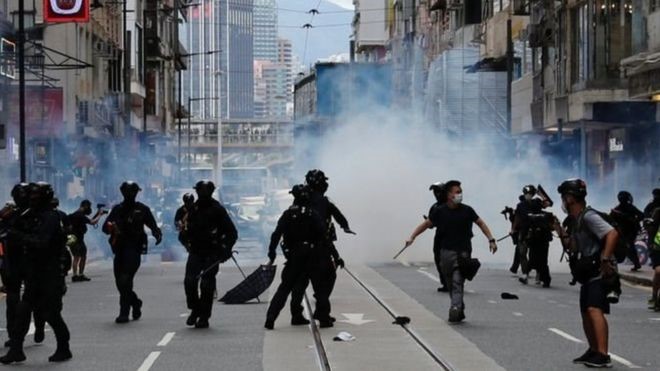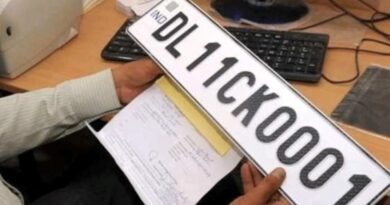Britain takes a big step even after China’s warning, cancels extradition treaty with Hong Kong
Britain’s Foreign Minister Dominic Raab has announced the suspension of his extradition treaty with Hong Kong ‘with immediate effect’ and ‘indefinitely’ as China imposed a new national security law on Hong Kong.
Announcing this in Parliament, the Foreign Minister said that ‘the UK wants a positive relationship with China’.
But he said that the imposition of a new national security law on Hong Kong by China was a ‘serious violation’ of international obligations to Britain.
This treaty was between the two countries for more than 30 years. The Labor Party has also supported changes in the existing law.
Dominic Raab also confirmed that the government would impose a ban on weapons, which has been in place in China since 1989, to be applied to Hong Kong, which led to Britain’s export of certain types of guns and weapons such as smoke grenades in the region. Will be done.
But China has accused the UK government that they are committed to maintaining international law and by making changes in it Britain has made ‘serious interference’.
Earlier China had said that it is interfering in its internal affairs and if Britain is adamant on its attitude then retaliatory action will be taken.
After America, Britain has now taken this tough step against China for the new security law in Hong Kong and the harassment of Weigar Muslims.
According to China’s official newspaper Global Times, China’s Foreign Ministry had appealed to Britain not to proceed on the wrong path, this would further damage the UK-China relationship.
The US has made several decisions regarding the new national security law in Hong Kong, the most important of these being to withdraw priority status in Hong Kong to trade.
Britain also offered people living in Hong Kong to come here.
On the other hand, China has said many times that the United States and Britain are internally
Are interfering in matters.
China says that America and Britain are trying to destabilize Hong Kong. Hong Kong was the first British colony.
Under the extradition treaty, if the criminals in Hong Kong fled to Britain, they could be captured and sent back to Hong Kong.
Earlier, Britain had ended the agreement of 5G technology from Chinese company Khwave.
According to the British government’s new decision, the country’s mobile providers have been banned from buying any equipment from Chinese company Khwave since 31 December.
With this, by 2027, the British mobile provider will have to remove all 5G kits of Khwave from its network.
It is believed that Britain is trying to give a strong message to China with all these decisions.
Like the US, there is talk of a ban on Chinese officials, but unlike the US, in the case of Britain, this is a complex process and it can take time.
The United States and Britain, as well as the European Union, have accused China of ignoring one system, two systems, which make Hong Kong the basis for greater autonomy.
Britain and America argue that China had guaranteed this in the 1984 agreement. Since 1997, Hong Kong has been controlled by China.
After the implementation of the new security law in Hong Kong, Britain invited three and a half million British Overseas National Passport holders to come to Britain and also said that they could be given citizenship in future.
Apart from these, about 26 lakh other citizens have also been offered to come to Britain.
British citizens in Hong Kong, who are on overseas passports, were granted special status in 1980. But currently their rights are limited and they can stay in the UK without a visa for only six months.
Under the government’s new scheme, all British expatriate citizens and their dependents will be given the right to live in Britain.
They will also have the right to work and study for five years. After six years, they can apply for citizenship.
Recently, the British Prime Minister Boris Johnson had said that the implementation of the new security law in Hong Kong is a clear and serious violation of the 1985 Sino-UK joint manifesto.
He said that the agreement is legally binding and explains how some aspects of independence in Hong Kong will be protected for 50 years (since China was declared a sovereign nation in 1997).
China says that it is interfering in its internal affairs and if Britain imposes a ban on any Chinese official then retaliation will be taken.
A senior UK judge also expressed concern over the extradition treaty. He said that the new law of Hong Kong poses a threat to the independence of the judiciary.
Lord Reid, President of the Supreme Court in Britain, has warned that the sitting of the British judges in Hong Kong’s Court of Final Appeal is now under threat and they should remain in tune with judicial independence and the rule of law.
There was also a lot of ruckus over the proposal for an extradition treaty between Hong Kong and China last year.
At that time, it was expressed that doing so would increase political interference in Hong Kong and also affect the right to fair justice.
Human rights issue
Britain has also taken a dig at China on the issue of human rights.
Britain has again raised the issue of harassment of Vigar Muslims in Xinjiang province of China and has said that there are forced sterilization of Vigar Muslim women there.
Britain’s Foreign Minister Dominic Robb accused the BBC of harassing Muslims in an interview.
However, Chinese Ambassador to Britain Liv Xiaoming denied these allegations. When the BBC asked him a question showing a drone footage, the ambassador said he denied all the allegations.
He said that such feet are shown repeatedly, but they have nothing to do with the truth.
He also denied allegations that the population of Weigar Muslims had fallen sharply in Xinjiang province.
However, he later said that he would investigate the video and talk about it. Regarding the sterilization of Vigar Muslims, he said that he does not deny a few cases, but the Chinese government has no such policy.
He said that people of all religions are treated equally in China.
What decisions other countries have made
The US has imposed visa restrictions on some important Chinese officials and organizations in cases related to Hong Kong and Weigar Muslims.
Apart from this, the US has also ended Hong Kong’s special trading status.
The US has imposed visa restrictions on some Chinese officials, citing the 2018 law on the issue of Tibet.
In recent times, the US has also raised the issue of Vigar Muslims loudly. He has also been critical of the ban on American journalists.
The director of the American Intelligence Agency has described China as America’s worst enemy.
Canada had lately postponed its extradition treaty with Hong-kong and also banned the export of many accessories related to military requirements.
What has changed in Hong Kong in the last few days
Canada has also issued a new advisory regarding the journey of Hong Kong.
Canada says that now anyone can be detained arbitrarily on the guise of national security in Hong Kong and then sent to China.
Australia is also considering providing shelter to Hong Kong residents. At the same time, Australia has also stopped its extradition treaty with Hong Kong.
Australian Prime Minister Scott Morrison says the new law ignores Hong Kong’s own basic law. At the same time, the basis of Hong Kong’s existing autonomy from China is also violated.
He said that his government and the governments of other countries have consistently expressed their concerns about Hong Kong’s new security law.
Over 100,000 Australians live in Hong Kong. Australia’s Ministry of Foreign Affairs and Trade has said, “The risk of your detention may increase in the name of national security. If you are concerned about the new law, you should consider staying in Hong Kong.” “
The New Zealand government has also said that it will review its relationship with Hong Kong.
New Zealand Foreign Minister Winston Peters said that his country is very concerned about the national security law.




